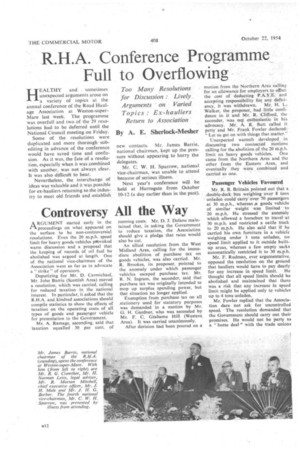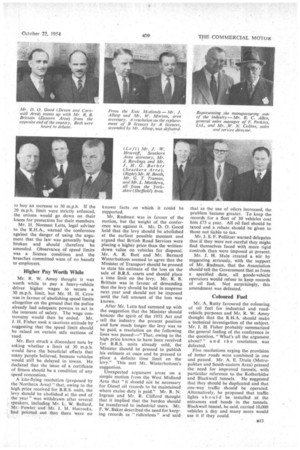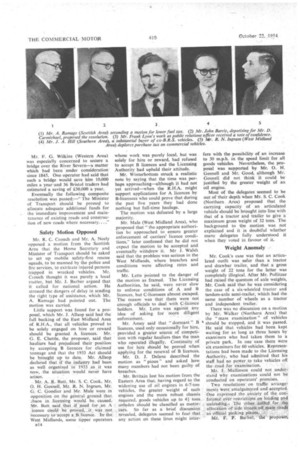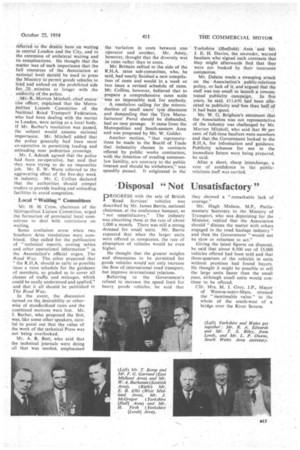R.H.A. Conference Programme Full to Overflowing
Page 46

Page 47

Page 48

Page 49

If you've noticed an error in this article please click here to report it so we can fix it.
Too Many Resolutions for Discussion : Lively Arguments on Varied Topics : Ex-hauliers Return to Association By A. E. Sherlock-Mesher
HEALTHY and sometimes unexpected arguments arose on a variety of topics at the annual conference of the Road Haulage Association at Weston-superMare last week. The programme was overfull and two of the 29 resolutions had to be deferred until the National Council meeting on Friday.
Some of the resolutions were duplicated and more thoroughsubediting in advance of the conference would have saved time and confusion. As it was, the fate of a resolution, especially when it was combined with another, was not always clear. It was also difficult to hear.
Nevertheless, the interchange of ideas was valuable and it was possible for ex-hauliers returning to the industry to meet old friends and establish
new contacts. Mr. James Barrie, national chairman, kept up the pressure without appearing to hurry the delegates.
Mr. C. W. H. Sparrow, national vice-chairman, was unable to attend because of serious illness.
Next year's conference will be held at Harrogate from October 10-12 (a day earlier than in the past).
motion from the Northern Area calling for an allowance for employers to offset the cost of deducting P.A.Y.E. and accepting responsibility for any defici ency, it was withdrawn. Mr. H. L. Walker, the proposer, had little confidence in it and Mr. R. Clifford, the seconder, was not enthusiastic in his advocacy. Mr. A. R. Butt called it petty and Mr. Frank Fowler declared: "Let us get on with things that matter."
Unexpected warmth develope4 in discussing two connected motions calling for the abolition of the 20 m.p.h.
limit on heavy goods vehicles. One came from the Northern Area and the other from the Eastern Area, and eventually they were combined and carried as one.
Passenger Vehicles Favoured Mr. R. B. Brittain pointed out that a double-deck bus weighing over 8 tons unladen could carry over 70 passengers at 30 m.p.h., whereas ,a goods vehicle of similar weight was limited to 20 mph. He stressed the anomaly which allowed a horsebox to travel at 30 m.p.h. and restricted a cattle truck to 20 m.p.h. He also said that if be carried his own furniture in a vehicle weighing under 3 tons unladen, no speed limit applied to it outside builtup areas, whereas a few empty sacks automatically restricted it to 30 m.p.h.
Mr. F. Rudman, ever argumentative, opposed the resolution on the ground that hauliers would have to pay dearly for any increase in speed limit. He thought that all speed limits should be abolished and maintained that there was a risk that any increase in speed limit might be applied only to vehicles up to 4 tons unladen.
Mr. Fowler replied that the Association dare not ask for uncontrolled speed. The resolution demanded that the Government should carry out their promises. He would not be party to a "horse deal" with the trade unions to buy an increase to 30 m.p.h. If the 20 m.p.h. limit were strictly enforced, the unions would go down on their knees for protection for their members.
Mr. H. Norman Letts, legal adviser to the R.H.A., warned the conference against the danger of using the argument that the law was generally being broken and should therefore be amended. Observance of speed limits was a licence condition and the breaches committed were of no benefit to employers,
Higher Pay Worth While
Mr. R. W. Amey thought it was worth while to pay a heavy-vehicle driver, higher . wages to secure a 30 m.p.h. limit, but Mr. H. H. Crow was in favour of abolishing speed limits altogether on the ground that the police already had adequate powers to act in the interests of safety. The wage controversy would then be ended. Mr. J. H. Fisher took a cautious attitude by suggesting that the speed limit should be raised on certain safe sections of road.
Mr. Butt struck a discordant note by asking whether a limit of 30 m.p.h. would have the beneficial effects that many people believed, because vehicles would still be delayed in towns. He declared that the issue of a certificate of fitness should be a condition of any speed concession.
A kite-flying resolution (proposed by the Northern Area) "that, owing to the high price received for B.R.S. units, the levy should be abolished at the end of the year" was withdrawn after several speakers, including Mr. L. W. Ballard, Mr. Fowler and Mr. J. M. Forrocks, had pointed out that there were no
known facts on which it could be supported.
Mr. Rudman was in favour of the motion, but the weight of the conference was against it. Mr. D. 0. Good held that the levy should be abolished at the earliest possible moment and argued that British Road Services were placing a higher price than the writtendown value on vehicles for disposal. Mr. A. R. Bute and Mr. Bernard Winterbottom seemed to agree that the Minister of Transport should be pressed to state his estimate of the loss on the sale of B.R.S. assets and should place a time limit on the levy. Mr. R. B. Brittain was in favour of demanding that the levy should be held in suspense next year and should not be imposed until the full amount of the loss was known.
After Mr. Letts had summed up with the suggestion that the Minister should honour the spirit of the 1953 Act and a tell the industry the present position and how much longer the levy was to be paid, a resolution on the following lines was passed:—" That, owing to the high price known to have been received for B.R.S. units already sold, the Minister should be pressed to publish his estimate at once and be pressed to place a definite time limit on the levy." This met Mr. Winterbottom's suggestion.
Unexpected argument arose on a simple motion from the West Midland Area that "it should n`ot be necessary for Diesel oil records to be maintained where excise duty is paid." Mr. R. N. Ingram and Mr. R. Clifford thought that it implied that the burden should be transferred to industrial users. Mr. F. W. Baker described the need for keeping records as " ridiculous " :sid said that as the use of oilers increased, the problem became greaten To keep the records for a fleet of 30 vehicles cost him £75 a year. All oil fuel should be taxed and a rebate should be given to those not liable to tax.
Mr. J. S. F. Pollitzer warned delegates that if they were not careful they might find themselves faced with more rigid controls than were imposed at present.
Mr. J. H. Male created a stir by suggesting seriously, with the support of Mr. Rudman, that the Association should tell the Government that as from a specified date, all goods-vehicle operators would refuse to keep records of oil fuel. Not surprisingly, this amendment was defeated.
Coloured Fuel
Mr. A. Rutty favoured the colouring of oil fuel for industrial and roadvehicle purposes and Mr. R. W. Amey thought that the R.H.A. should make a technical investigation of the subject. Mr. J. H. Fisher probably summarized the general feeling of the conference in the question, "What's all the argument about?" and the resolution was defeated.
Five resolutions urging the provision of better roads were combined in one and passed. Mr. A. E Drain (Metropolitan and South-eastern Area) pressed the need for improved tunnels, with particular reference to the Rotherhithe and Blackwall tunnels. I4e suggested that they should be duplicated and that one-way traffic should be operated. Alternatively, he proposed that traffic lights should be installed at the entrances and bends in the tunnels. Blackwall tunnel, he said, carried 10,000 vehicles a day and many more would use it if they could. Mr. F. G. Wilkins (Western Area) was especially concerned to secure •a bridge over the River Severn---a matter which had been .under consideration since 1845. One operator had said that such a bridge would save him 10.000 miles a year and36 Bristol traders had estimated a saving of £30,000 a year.
Eventually the following composite resolution was passed:—" The Minister of Transport should be pressed to allocate adequate additional funds for the immediate improvement and maintenance of existing roads and construction of new roads where necessary...."
Safety Motion Opposed
Mr. R. C. Crouch and Mr. A. Neely opposed a motion from the Scottish Area that the Home Secretary and Minister of Transport should be asked to set up mobile safety-first rescue squads, to be manned by the police and fire services, to extricate injured persons trapped in wrecked vehicles. Mr. Ctouch thought it was purely a local !natter, but Mr. J. Barber argued that it called for national action. He stressed the dangers of delay in sending the right type of assistance, which Mr. A. Ramage had pointed out. The motion was carried.
Little support was found for a proposal, which Mr. I. Allsop said had the full backing of the East Midland Area of R.H.A., that all vehicles proved to' be solely engaged on hire or reward should be granted A licences. Mr. G. E. Chettle, the proposer, said that hauliers had prejudiced their position by accepting B licences for claimed tonnage and that the 1933 Act should be brought up to date. Mr. Allsop declared that it the industry had been as well organized in 1933 as it was now, the situation would never have arisen.
Mr. A. R. Butt, Mr. S. C. Cook, Mr, 0. H. Gosnell, Mr. R. N. Ingram, Mr. G. C. Goodier and Mr. Male were in opposition on the general ground that zhaos in licensing would be caused., Mr. Butt said that if need for an A icence could be proved, it. was not necessary to accept a .13 licence. In the West Midlands, some tipper operators u14
whose work was purely local, but was solely for hire or reward, had refused to accept B licences and the Licensing Authority had upheld their attitude.
Mr. Winterbottom struck a realistic note by saying that the time was perhaps approaching—although it had not yet arrived—when the R.H.A. might support applications for A licences by B-licensees who could prove that during the past five years they had done nothing but full-time haulage.
The motion was defeated by a large majority.
Mr. Male (West Midland Area), who proposed that " the appropriate authorities be approached to ensure greater enforcement of carriers' licence conditions," later confessed that he did not expect the motion to be accepted and eventually withdrew it. Mr J. Walsh said that the problem was serious in the West Midlands, where breaches and conditions were affecting rates and traffic.
Mr. Letts pointed to the danger of the motion as framed. The Licensing Authorities, he said, were never slow to enforce conditions of A and B licences, but C-licensees almost escaped. The reason was that there were •not enough officials to deal with C-licence holders. Mr. Letts was against any idea • of asking for more diligent enforcement. -' Mr. Amey said that " dormant B licences, used only occasionally for hire, provided a greater source of competition with regular hauliers than the man who operated illegally. Continuity of use for hire should be proved when applying for the renewal of B licences.
Mr. D. J. Delane described the motion as " pious " and asked how many members had not been guilty of breaches.
Mr. Brittain lost his motion from the Eastern Area that, having regard to the widening use of oil engines in 6-7-ton vehicles, the greater weight of such engines and the more robust chassis required, goods vehicles up to 41tons unladen should be classified as motorcars, So far as a brief discussion revealed, delegates seemed to fear. that any action on these lines might inter
fere with the possibility of an increase to 30 m.p.h. in the speed limit for all goods vehicles. Nevertheless, the proposal was supported by Mr. 0. H. Gosnell and Mr. Good, although Mr. Gosnell did not think it could be justified by the greater weight of an oil engine.
Most of the delegates seemed to be out ottheir depth when Mr. S. C. Cook (Northern Area) proposed that the carrying capacity of an articulated vehicle should be brought into line with that of a tractor and trailer to give a maximum gross weight of 32 tons. The background to the motion was not explained and it is doubtful whether many delegates fully understood it when they voted in favour of it.
Weight Anomaly
Mr. Cook's case was that an articulated outfit was safer than a tractor and drawbar trailer, and that a gross weight of 22 tons for the latter was completely illogical. After Mr. Pollitzer had raised the question of axle weights, Mr. Cook said that he was considering the case of a six-wheeled tractor and tandem-axle semi-trailer, which had the same number of wheels as a tractor and independent trailer.
There was no discussion on a motion by Mr. Walker (Northern Area) 'that the "mass examination" of vehicles should be stopped, and it was passed. He said that vehicles had been kept waiting for as long as three hours by examiners who had taken them to a private park. In one case there were six examiners for 60 vehicles. Representations had been made to the Licensing Authority, who had admitted that his staff had no power to take vehicles off the road for examination.
Mr. I.. Mallinson could not understand why examinations could not be conducted on operators' premises.
Two resolutions on traffic arrangements were: amalgainated and-accepted. One expressed the anxiety of the con-. ference over reStrictions on loading and unloading.The other ,eatted for the allocation of side streets off xnain roads ai:Official parking places.
M. F. P. Barber, the proposer,
referred to the drastic bans on waiting in central London and the City, and to the extension of unilateral waiting and its complications. He thought that the matter was of such importance that the full resources of the Association at national level should 'be used to press the Ministry to permit goods vehicles to load and unload on the prohibited side for 20 minutes or longer with the
authority of the police. , Mr. R. Morton Mitchell, chief executive officer, explained that the Metrotliati tan Liaison Comnaittee of the National Road :Transport Federation, who had been dealing with the matter in London, were acting as a local body. If Mr. Barber's resolution was passed, the subject would assume national importance_ Mr. Mitchell added that the police generally had been most co-operative in permitting loading and unloading near pedestrian crossings.
Mr. J. Adcock agreed that the police had been co-operative, but said that they were trying to do an impossible job. Mr. E. W. Watts referred to the aggravating effect of the five-day week in industry. Mr. C. Collins declared that the authorities should compel traders to provide loading and unloading facilities to avoid congestion.
Local " Waiting " Committees
Mr. H. H. Crow, chairman of the Metropolitan Liaison Committee, urged the formation of provincial local committees to deal with restrictions on waiting.
Some confusion arose when two Southern Area resolutions were combined. One called for the publication of "technical report, costing tables and other operational information " in the Association's official organ, The Road Way. The other proposed that "the R.H.A. should as early as possible issue a rates schedule for the guidance of members, so graded as to cover all classes of traffic and mileages, which could be easily understood and applied," and that it all should be published in The Road Way.
In the event, the discussion turned on the desirability or otherwise of standardized rates and the combined motions were lost. Mr. J. Barber, who proposed the first, was, like some other speakers, careful to point out that the value of the work of the technical Press was not being overlooked.
Mr. A. R. Butt, who said that the technical journals were doing all that was needed, emphasized
the variation in costs between one operator and another. Mr. An-ley, however, thought that the diversity was in rates rather than in costs.
Mr. Brittain rallied to the side of the R.H.A. rates sub-committee, who, he said, had nearly finished a new compilation of costs and would in a week or two issue a revised schedule of rates. Mr. Collins, however, believed that to prepare a comprehensive rates scale was an impossible task for anybody.
A resolution calling for the reintroduction of small users' tyre discounts and demanding that the Tyre Manufacturers' Panel should be disbanded, had an easy passage. It came from the Metropolitan and South-eastern Area and was proposed by Mr, W. Golder.
Another motion, "that representations be made to the Boaid of Trade that indemnity clauses in contracts offered by public works contractors, with the intention of evading commonlaw liability, are contrary to the public interest and should be withdrawn," was speedily passed. It originated in the
Yorkshire (Sheffield) Area and Mr. J. E. H. Davies, the seconder, warned hauliers who signed such contracts that they might afterwards find that they were not backed by their insurance companies,
Mr. DeIane made a sweeping attack on the Association's public-relations policy, or lack of it, and argued that the staff was too small to launch a concentrated publicity campaign. In five years, he said, £11,650 had been allocated to publicity andiess than half of it had been spent.
Mr. W. G. Brigham's statement that the Association was not representative of the industry was challenged by Mr. Morton Mitchell, who said that 90 per cent, of full-time hauliers were members and that the Government looked to the R.H.A. for information and guidance. Publicity schemes for use in the immediate future were being prepared, he said.
After a short, sharp interchange, a vote of confidence in the publicrelations staff was carried.




































































































